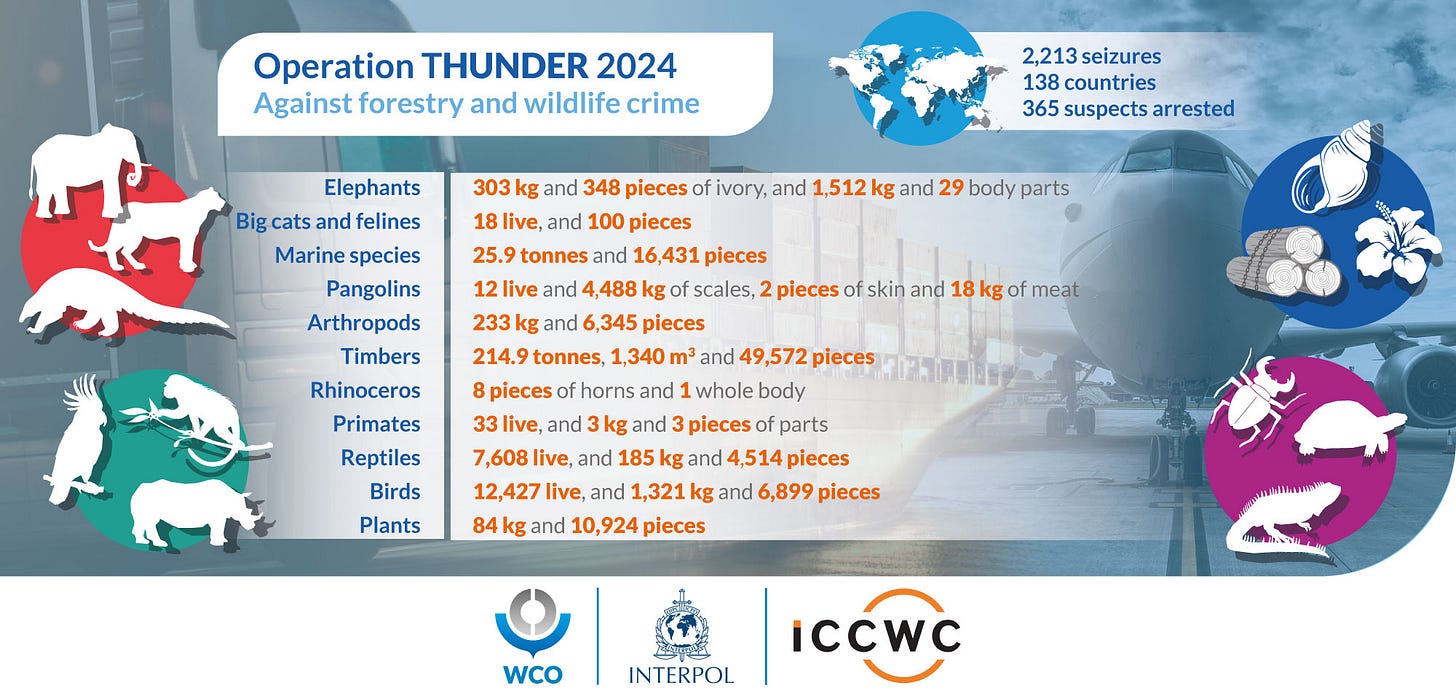Canada’s Efforts in the Largest Wildlife and Forestry Trafficking Crackdown Ever
A global task force targets the illegal trade of endangered species and protected plants.
Described as the “largest-ever wildlife and forestry operation,” details have emerged on Canada's role in "Operation Thunder: 2024"
Last year, in the fall of 2024, officers from the Ministry of Environment and Climate Change, along with agents from Canada Border Services Agency, participated in the world’s largest wildlife & forestry trafficking task force.
Known as “Operation Thunder 2024,” an international task force, comprised of officers from 138 countries, arrested 365 suspects, and seized approximately 20,000 live animals, which were identified as endangered or protected species.
For Canada’s part, officers from the Ministry of Environment and Climate Change seized approximately 800 items, containing plants or animals which are regulated by an agreement, known as the Convention on International Trade in Endangered Species of Wild Fauna and Flora (CITES).
Some of the items seized in Canada include:
Supplements made with seahorses (Hippocampus spp.)
Boxes of sturgeon caviar
Clothing and accessories made from reptile skin
Various plant species of cacti and succulents
Orchids and lotions containing orchid flowers
Other illegally imported and protected plants like Venus flytraps and pitcher plants
CITES is an international agreement with 185 participating countries and the European Union, working to regulate trade in endangered species.
“Organized crime networks are profiting from the demand for rare plants and animals, exploiting nature to fuel human greed. This has far-reaching consequences: it drives biodiversity loss, destroys communities, contributes to climate change and even fuels conflict and instability.
“Environmental crimes are uniquely destructive, and INTERPOL, in cooperation with its partners, is committed to protecting our planet for future generations.” INTERPOL Secretary General, Valdecy Urquiza, said in a press release.
“Operation Thunder 2024” is the eighth global operation in the yearly “Thunder” series, which started with Operation Thunderbird in 2017, under the coordination of INTERPOL and the World Customs Organization (WCO).
In 2023, Canada also took part in “Operation Thunder 2023” which saw Ministry of Environment and Climate Change Canada enforcement officers participate, with support from the Canadian Border Services Agency and Royal Canadian Mounted Police
The 2023 operation saw Canada seize:
Fourteen Sandhill Cranes
One alligator head
Two boxes and eight freezer bags containing shark fin
Two live tortoises
Eight Green Tree Pythons
Two black bear bacula (penis bones)
Wildlife trafficking remains a problem in Canada. In June 2024, a woman was arrested while attempting to smuggle 29 protected turtles across a Vermont lake into Canada by kayak. Her attempt was thwarted by U.S. Customs and Border Enforcement officers, who found the Eastern box turtles individually wrapped in socks in a duffle-bag, the Associated Press reported
In a troubling development from late 2024, Canada allowed the import of long-tailed macaques from Cambodia, despite growing evidence suggesting that these animals were illegally trafficked and may pose serious public health risks, as reported in an investigation by TorontoToday.
The ongoing issues with wildlife trafficking and the import of potentially harmful species like the Cambodian macaques highlight the need for stronger protections.
Be sure to follow me on social media!
Instagram: https://www.instagram.com/randomphotoadventure
Facebook: https://www.facebook.com/randomphotoadventure
BlueSky: randomphotoadv.bsky.social
Have a tip, story idea, event, or want to appear as a guest column? Contact me or get in touch by emailing randomphotoadventure@substack.com




